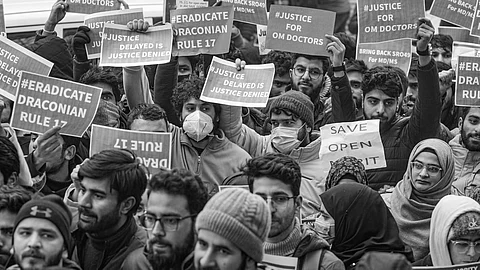

The Jammu & Kashmir Students Association (JKSA) has launched a comprehensive report against what it calls a "flawed and disproportionate" reservation system in the Union Territory, submitting an 80-page research report with 15 key recommendations to the Chief Minister's office today, Monday, June 9.
The meticulously researched document, prepared in collaboration with the J&K Centre for Peace, Research & Sustainable Development, presents a sharp critique of existing reservation policies and calls for immediate reforms to address what the student body describes as persistent social inequities.
"This report is a roadmap. It traces the evolution of reservation trends in J&K, compares them with national and international benchmarks, and highlights glaring disparities that continue to marginalise large sections of society," said Nasir Khuehami, National Convenor of JKSA, during the report's launch.
The timing of the report's submission appears strategic, coming just as the government prepares to release policy documents. However, the students' frustration with the pace of reform is evident. In an exclusive interview with EdexLive, Khuehami expressed disappointment with the government's response to mounting pressure for reservation reform.
"The reservation issue has been the talk of the town in Jammu and Kashmir for the past two years," Khuehami told EdexLive. "Many political parties put it in their election manifestos, saying that if they were voted to power, they would try to address the reservation policy in Jammu and Kashmir. But it has been almost nine months. The government has not initiated any proper process as of now."
Government response awaited
The report was handed over to Nasir Sogami, Advisor to Chief Minister Omar Abdullah, who assured the delegation that "the researched report will be read, reviewed, and taken into consideration for necessary policy action." However, students remain sceptical about the government's commitment to meaningful reform.
The 12-member expert committee that formulated the report, chaired by JKSA President Ummar Jamal, includes representatives from diverse academic, legal, and policy backgrounds. Their recommendations include conducting a caste-based socio-economic census, sub-categorisation within reserved categories, rationalising eligibility criteria for the Economically Weaker Sections (EWS) category, and restoring the 60:40 ratio between open merit and reserved categories.
"We are not against reservations," Khuehami emphasised. "Our fight is against a flawed, disproportionate system that has failed to benefit the genuinely deserving and has sidelined meritorious candidates. We advocate for a balanced framework that ensures both upliftment and meritocracy."
Recruitment controversy highlights systemic issues
The students' concerns gained fresh urgency with a recent recruitment notification that they say exemplifies the system's flaws.
The Jammu and Kashmir Service Selection Board (JKSSB) advertised 75 posts for Naib Tehsildar, allocating only 30 posts (40%) to open merit categories while reserving 45 posts (60%) for various reserved categories.
"This allocation exposes the flaws in the existing reservation policy framework," said Khuehami. "It clearly shows that the government is not sincere. One MLA and one cabinet subcommittee are saying one thing, their party is saying another, and the chief minister is saying a third thing."
The association has called for a temporary slowdown in recruitment drives until the reservation structure is reformed. "We're not calling for a complete halt, but continuing recruitment under a flawed system is a grave injustice to open-merit candidates," the association clarified.
Building broader consensus
The JKSA plans to expand its campaign beyond student circles, reaching out to civil society organisations, academic institutions, and community leaders to build consensus for reform. The association will compile a follow-up white paper based on feedback from various stakeholders through physical meetings, digital town halls, and written submissions.
"This must be a people-centric reform process. No voice should be left unheard," the association stated. "We are committed to reaching every section of society to build a unified call for a rational, transparent, and equitable reservation policy."
The students acknowledge the unique challenges of organising in J&K but remain determined to pursue their cause. "Obviously, things are different in J&K than other states and need to be decided properly before taking any action," Khuehami noted, indicating that future strategies are being carefully considered.
As the government faces mounting pressure from multiple quarters, including protests outside the Chief Minister's residence and demonstrations by political leaders, the student body's comprehensive research report adds academic weight to demands for reservation reform. Whether this will translate into concrete policy changes remains to be seen, but the students have made it clear they won't back down from their fight for what they call "social justice" and "constitutional morality."
